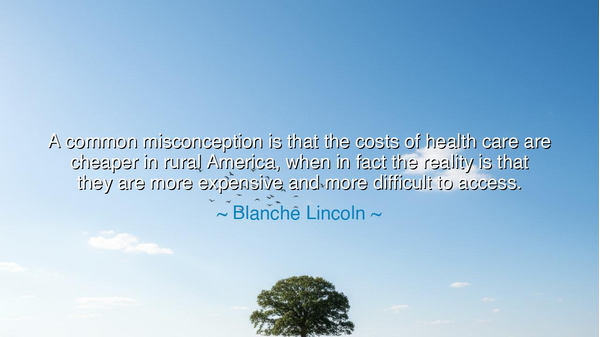
A common misconception is that the costs of health care are
A common misconception is that the costs of health care are cheaper in rural America, when in fact the reality is that they are more expensive and more difficult to access.






The wise stateswoman Blanche Lincoln, who served as both a farmer’s daughter and a voice in the halls of government, once spoke a truth often ignored by the noise of modern discourse: “A common misconception is that the costs of health care are cheaper in rural America, when in fact the reality is that they are more expensive and more difficult to access.” Her words, though shaped by policy, strike the deeper chord of justice and human dignity. In them we hear not merely a statement of economics, but a cry for awareness—a reminder that distance from the centers of power and prosperity often means distance from healing itself.
To understand Lincoln’s words, one must first see the land she speaks of: the vast plains and quiet towns that lie beyond the cities’ glow, where people work the soil, raise families, and build their lives on the faith of community. To the outsider, such places may seem simple and serene, untouched by the troubles of the world. Yet beneath that calm lies a hard truth—isolation, and with it, scarcity. In the cities, hospitals rise like towers, specialists gather in abundance, and the hum of technology fills every corridor. But in the countryside, a single clinic may serve a hundred miles of homes, and one ambulance may take an hour to arrive. Here, health care is not cheaper—it is harder bought, harder reached, and more precious.
Lincoln’s insight was forged not from theory, but from life itself. Born and raised in Arkansas, she knew the rhythms of rural existence—the distance between farm and town, the patience and pride of those who live close to the land. She understood that when illness comes to such places, it does not strike alone. It is joined by the long road to the nearest doctor, the burden of lost work, the cost of travel and medicine, and the quiet fear that help may not come in time. Thus, when she spoke of the “misconception” of cheap care, she was unveiling the hidden cost that urban eyes cannot see: the cost of remoteness, the cost of being forgotten.
History, too, bears witness to this truth. In the early days of the American frontier, communities were bound not by wealth, but by mutual care. When plague or injury struck, the people relied on traveling physicians, who crossed rivers and mountains to reach the sick. These healers—like the ancient physicians of Greece or the barefoot doctors of China—knew the sacred duty of tending to those who lived farthest from the centers of privilege. Yet as the world grew more complex, and cities drew the talent and resources of the nation, those rural places were left behind. Hospitals closed. Clinics vanished. The wisdom of Lincoln’s words echoes the lament of those healers long gone: that distance breeds inequity, and neglect is the most expensive medicine of all.
There is a moral lesson here that stretches beyond geography. The health of a nation is not measured by the wealth of its capitals, but by the well-being of its remotest villages. When the farmer cannot afford treatment, when the miner must travel half a day to reach care, when the nurse in a small town carries the burden of a dozen roles—then the nation’s health is wounded, no matter how advanced its cities may seem. True civilization is not found in technology alone, but in the compassion that bridges the gap between abundance and need.
The lesson, therefore, is twofold. First, let those in positions of power remember that equality in health is not achieved by policy alone, but by presence—by bringing doctors, resources, and respect to the places where they are most needed. Second, let every citizen remember that community is the first medicine. Where hospitals are few, the heart must work harder; where systems falter, neighbors must rise. To support one another, to speak for the unheard, to care for the unseen—these are acts of healing as vital as any prescription.
So, children of the wide land and the crowded city alike, heed the wisdom of Blanche Lincoln. Do not believe that rural life is easier or cheaper in its struggles; know instead that it is richer in endurance, and deeper in sacrifice. When you think of health, think not only of your own, but of the farmer tending his field with a fever, of the mother driving hours for her child’s care, of the elder waiting for the clinic that may never come. Their well-being is bound to yours, as the roots of distant trees drink from the same hidden river.
And remember this truth above all: the strength of a nation is measured not by its tallest buildings, but by how it tends to its farthest hearts. Where health is uneven, hope falters; where compassion is present, healing begins. Thus, as Lincoln taught, let us labor until the promise of care reaches every road, every valley, and every forgotten home—so that no one, in city or countryside, must pay the highest price of all: the price of being left behind.






AAdministratorAdministrator
Welcome, honored guests. Please leave a comment, we will respond soon